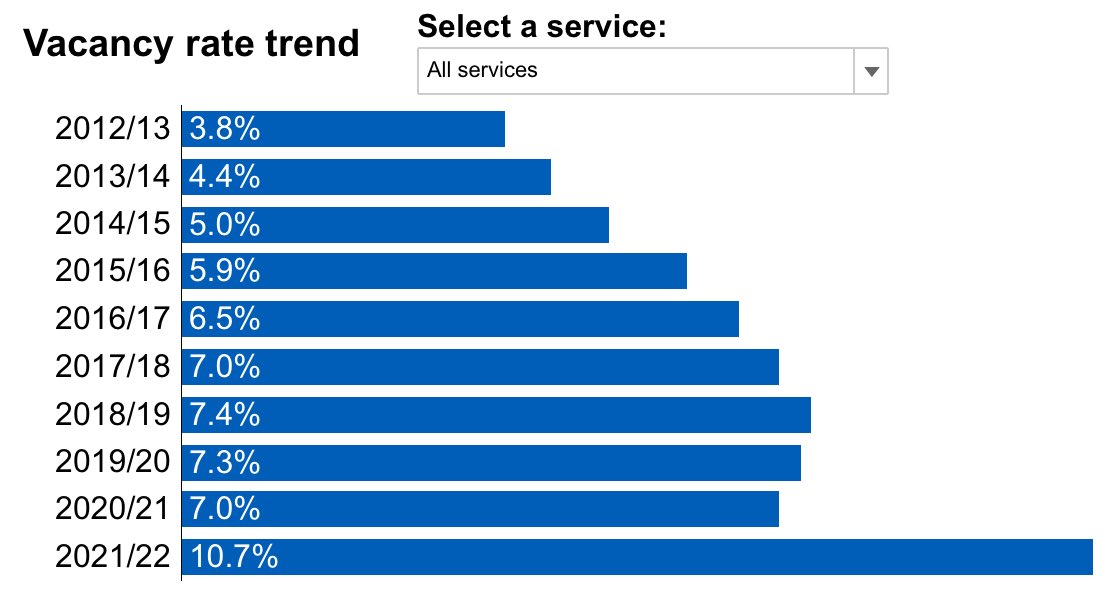Today’s @skillsforcare report paints a seriously grim picture of the #socalcare workforce situation. It’s not just bad, it’s the worst it’s ever been and may well be deteriorating further. A thread…
skillsforcare.org.uk/Adult-Social-C…
skillsforcare.org.uk/Adult-Social-C…
First, the vacancy rate. After 2 years of small improvements, look at the huge jump in vacancies between 2020/21 and 2021/22. Then look at the further increase (light green bar) to August this year. This is a problem that isn’t going away. 

Vacancies aren’t just a #socialcare problem, they affect the wider economy too. But this chart shows that #socialcare is faring much worse than other sectors. The vacancy rate is 10.7% in social care compared to 4.3% elsewhere. 

And here’s the same story but broken down by sector. The NHS is struggling to recruit and so is the hotel/catering sector but #socialcare is performing far worse. 

It’s not just that there are more vacancies, the no. of staff has actually fallen. For years, filled posts increased as demand for services was pushed up by an ageing population and increased working age disability. That demand is still there but now we just can’t get the staff. 

(By the way, does the rising vacancy rate really matter? Of course it does. It’s not just that people can’t get the care they need, or that hospitals can’t discharge because providers don’t have the staff to provide the support. It also impacts quality, as these stats show. ) 

The sector IS responding. For one thing, it’s looking to different places to recruit. A greater proportion of new starters are now from overseas… 

(In fact, overseas recruitment is now starting to return to its former pattern when there were far more staff from non-EU countries than EU. That narrowed with when Eastern European countries joined the EU but is now moving the other way, presumably due to Brexit) 

But, as the govt’s own immigration body has observed, overseas recruitment is by no means the long-term solution to workforce problems in adult social care. What’s really needed is better funding, allowing action to improve terms and conditions for staff. Which brings us to pay…
There ARE hints that the crisis is forcing providers to increase their wages. Pay has started to rise faster than the increase in the statutory national living wage, which it used to follow closely. 

But the increase may simply not be big enough to make the sector much more competitive with health, hotels, supermarkets. When we published this blog in August, Tesco was paying its staff £10.10 an hour. Now it’s paying £10.30. kingsfund.org.uk/blog/2022/08/h…
What’s to be done? It’s not simple. There are big, broad economic and cultural issues at work that leave #socialcare staff poorly paid. And many, many other countries are seeing similar difficulties in recruiting enough health and, particularly, care staff.
Providers aren’t powerless. There’s a big difference between the best performers and the average on issues like retention - hanging on to your staff isn’t just about money. And there’s an issue with young people that needs exploring - half of under 20s leave in their first year. 

Providers have a difficulty in striking the balance between arguing for more funding/better pay while at the same time trying to persuade people to come and work in #socialcare now. Getting that messaging right repay some thought, though perhaps it is just an impossible tension.
So govt is critical. It should commit to a #socialcare workforce strategy, start delivering on its white paper commitment on training etc, and at least look like it is willing to tackle pay (the £500m discharge fund is a help but not the long-term answer). Will it? No sign yet.
• • •
Missing some Tweet in this thread? You can try to
force a refresh









